
Incheon, formerly Jemulpo or Chemulp'o (Korean: 제물포) until the period after 1910, officially the Incheon Metropolitan City (인천광역시), is a city located in northwestern South Korea, bordering Seoul and Gyeonggi Province to the east. Inhabited since the Neolithic, Incheon was home to just 4,700 people when it became an international port in 1883. Today, about 3 million people live in the city, making it South Korea's third-most-populous city after Seoul and Busan.
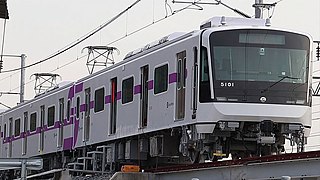
Seoul Subway Line 5 of the Seoul Metropolitan Subway, dubbed the purple line, is a long line crossing from west to the east across the Seoul National Capital Area, South Korea. It is one of two subway lines in Seoul to cross under the Han River, which is done at two points. The main line runs through to Hanam Geomdansan Station while the branch line from Gangdong Station terminates at Macheon Station. In 2019, Line 5 carried an annual ridership of 334 million or about 915,000 passengers per day.

Guri is a city in Gyeonggi Province, South Korea. It is located immediately to the east of Seoul, in the heart of the Capital Metropolitan Area.

Seoul Subway Line 3 of the Seoul Metropolitan Subway is a rapid transit service that connects Eunpyeong District to Gangnam and southeastern Seoul. Most trains head further northwest to serve Goyang via the Ilsan Line. In 2021, the Seoul Metro operated section had an annual ridership of 295,930,000 or 810,767 passengers per day.

Seoul Subway Line 4 of the Seoul Metropolitan Subway is a long line crossing from the southwest to the northeast across the Seoul National Capital Area. The central section in Seoul City is operated by Seoul Metro with some trains offering through service to Korail's Ansan and Gwacheon Lines. The southern terminus (Oido) is in Jeongwang 4-dong, Siheung City, and the northern terminus (Jinjeop) is in Jinjeop-eup, Namyangju-si, Gyeonggi-do; the newly built northern section is correspondingly owned by a company owned by Namyangju-si, with operations contracted to Seoul Metro. In 2022, the Seoul Metro operated section had an annual ridership of 219,587,000 or about 601,608 passengers per day.
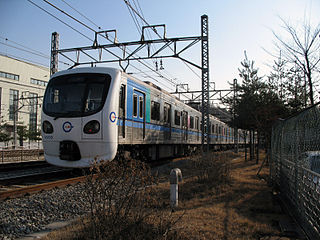
The Incheon Subway is a subway system serving the South Korean city of Incheon. The system is operated by Incheon Transit Corporation, and is part of the greater Seoul Metropolitan Subway.

The Shinbundang Line Korean: 신분당선; Hanja: 新盆唐線; literally, New Bundang Line) or DX Line for Dynamic Express Line is a 33.4 km (20.8 mi) long line of the Seoul Metropolitan Subway. It is the world's fifth subway to run completely driverless and the second completely driverless metro line to open in South Korea, after Busan Subway Line 4. It connects Sinsa station and Gwanggyo station in 42 minutes, a feat achieved by being the first line to operate South Korea's next-generation subway car travelling at over 90 km/h (56 mph), with the fastest average speed of any subway line in the country.

Dangsan Station (Korean: 당산역) is an elevated station on the Seoul Subway Line 2 and is an underground station on the Seoul Subway Line 9. The station is located on the south bank of the Han River in Yeongdeungpo District. Because the station is elevated, trains exiting to or entering from the north make use of the Dangsan Railway Bridge. As of April 2009, the platform has been outfitted with platform screen doors. Dangsan station is currently a transfer point between Line 2 and Seoul Subway Line 9. Several Korean TV series were shot in nearby locations, like Boys Over Flowers, Iris or My Girlfriend is a Gumiho.

Sinsa station is a station on the Seoul Subway Line 3 and the Shinbundang Line. It is located in Sinsa-dong, Gangnam-gu and Jamwon-dong, Seocho-gu, Seoul. It will serve as the northern terminus of the Wirye–Sinsa Line when it is opened in 2025.

Gupabal Station (Korean: 구파발역) is a station on the Seoul Subway Line 3. Some Line 3 trains only offer service up to this station, although it is not the technical end of Line 3. The name comes from 'Pabal', a Joseon-era post station that existed in the area. Nearby attractions include Jingwan Neighborhood Park, Gupabal Falls, Bukhansan National Park and Seooreung, a cluster of royal tombs. Lotte Mall, Eunpyeong NewTown and Eunpyeong Hanok village is near the station.
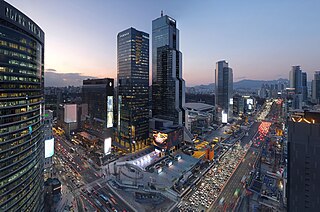
Gangnam District is one of the 25 districts of Seoul, South Korea. The term Gangnam translates to "South of the [Han] River". Gangnam District is the third largest district in Seoul, with an area of 39.5 km2 (15.3 sq mi). As of the 2024 census, Gangnam District had a population of 556,570. There is a high concentration of wealth in the district, with prices for an apartment as of 2024 more than double those in the rest of Seoul. Gangnam District is part of Gangnam School District Eight, along with the Seocho District. This district shares half of Gangnam-daero Gangnam Station area with Seocho District, which is one of the most crowded places in South Korea.

Buramsan Station (Korean: 불암산역) is a station on Line 4 of the Seoul Metropolitan Subway network. It was the northern terminus of Line 4, until 19 March 2022, when the line was extended to Jinjeop. It is an elevated station. The name of the subway station comes from its local name. Regional names refer to the pass that travelers carried over because of wild animals.
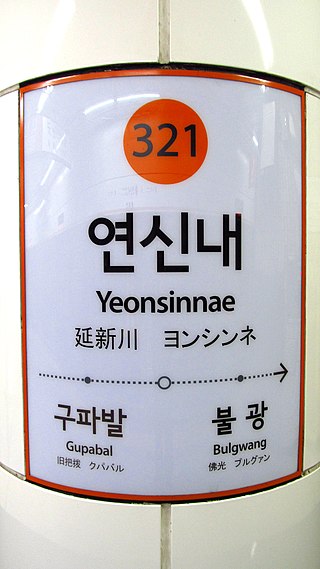
Yeonsinnae station is a station on Seoul Subway Line 3 and Seoul Subway Line 6, on the northwest side of Seoul in the urban area of Eunpyeong-gu. Although Yeonsinnae Station had a corresponding hanja name (延新內), this name was deemed incorrect and dropped in May 2001.
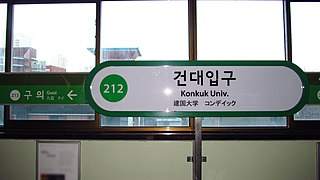
Konkuk University Station is a rapid transit station on Seoul Subway Line 2 and Seoul Subway Line 7. It is located in Hwayang-dong in the Gwangjin-gu administrative district of Seoul. It is adjacent to Konkuk University from which it takes its name. Line 2 is serviced by an elevated platform while Line 7 is serviced by an underground platform. The station has connections to ten bus lines through its six exits as well as a connection to the airport shuttle bus. The station services Hwayang-dong as well as Jayang-dong and Noyu-dong. The area around the station is mixed residential and small commercial businesses. Exits from the underground Line 7 platform open into Konkuk University and the adjacent Star City shopping and high-rise residential tower complex.

Oido station is a subway station on Seoul Subway Line 4 and the Suin–Bundang Line in Siheung, South Korea. It is the current southwestern terminus of Seoul Subway Line 4 located almost 30 kilometers southwest of Seoul, connecting Oido to other parts of Korea. A commuter rail trip between this station and Seoul Station takes over an hour, and a train servicing depot is located nearby. The name of the station was decided by the surrounding area Oido island.

Incheon Subway Line 2 is a driverless, medium-capacity subway line running 29.2 km (18.1 mi) from Oryu-dong in Seo-gu to Incheon Grand Park, with 27 stations, part of the Incheon Subway system. The line is also included as a part of the overall Seoul Metropolitan Subway network; Juan station has a free transfer with Seoul Subway Line 1, Geomam station connects with the AREX Line to Incheon International Airport and Seoul Station, and Seongnam also has a free transfer with Seoul Subway Line 7.

Samseong-Dong is an affluent neighborhood or ward of Gangnam-gu in Seoul, South Korea.

Seojeongni Station is a station in Seojeong-dong, Pyeongtaek, South Korea. Mugunghwa-ho trains running on the Gyeongbu Line stop here. Additionally, services on Seoul Subway Line 1 have been calling at this station since 2005. Its station subname is Kookje College.

Juan station is a subway station on the Seoul Metropolitan Subway Line 1 and Incheon Subway Line 2. This station receives the second-highest number of crowds along the entire Incheon line due to its proximity to the downtown area. It is also near Inha University and Inha Technical College.

Station numbering is a sign system which assigns station codes consisting of a few letters and numbers to train stations. It aims to facilitate navigation for foreign travelers not familiar with the local language by using globally understood characters. The system is now in use by various railway companies around the world such as in Mainland China, Indonesia, Japan, South Korea, Singapore, Taiwan, Thailand, and the United States.





















